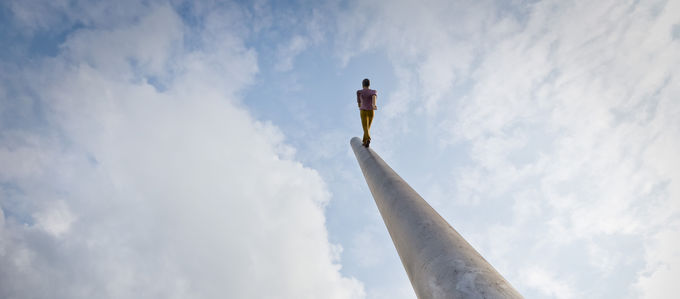"Onward, upward, homeward..." in stereo
When Chief Apostle Jean-Luc Schneider sets off for the Good Friday divine service, he will also be following a cultural connection that will most likely be familiar to friends of modern art. It has to do with a sculpture that reminds us of a hymn from our choir book: "Onward, upward, homeward..." — a brief page view:

They are practically twins: the "Man Walking to the Sky" and the "Woman Walking to the Sky". Each steel pole is 25 metres long and 50 centimetres thick, and ascends into the air at an angle of 63 degrees. At two thirds of the height of each, a painted fibreglass figure is depicted hurriedly walking into the sky.
Confidence and the striving to go higher
The "Man Walking to the Sky" stands in front of the Kulturbahnhof, a railway station in Kassel, Germany. It is in this North Hessian city that the Chief Apostle will conduct a Good Friday divine service which will be transmitted over a vast region throughout the District Apostle district. The "Woman Walking into the Sky" is located at the "Place des Halles" in Strasbourg. It was there that Jean-Luc Schneider was born, and it is still his place of residence today.
The "Man Walking to the Sky" is considered a symbol of optimism and confidence, as well as a hallmark of a hopeful future and a development that continually strives for improvement. However, its creator, the American artist Jonathan Borofsky, also sees this as a man broaching frontiers: the "Man Walking to the Sky" may well be on his way upward, but must also always keep his balance in the process. And the end of his journey is within view.
Community project and identifying feature
The "Man Walking to the Sky" also represents a community project, however—at least in Kassel: in the year 1992, the sculpture was the star of the "documenta", the most important exhibition of contemporary art in the world. The work of art found such resonance among the population that—still during "documenta IX"—it inspired a citizen's initiative with the objective of buying the installation for the city.
The approximately 700,000 Marks required to purchase and transport the piece were financed by a broad-based fund-raising campaign: students built and sold 600 small replicas of the "Man Walking to the Sky", retailers contributed a portion of the proceeds of each replica sold, a communications company had specially designed telephone cards made, and various government cultural establishments also made large contributions.
Since then the "Man Walking to the Sky" has not only enjoyed great popularity as a merchandising product, but has also become a symbol used in the logos of various clubs, restaurants, and other institutions. The community project has thus become an identifying feature of the city.
Photo: Frank Lindecke - Himmelsstürmer // Skystriker- CC BY-ND
Article info
Author:
Date:
Keywords:
Andreas Rother
02.04.2015
landsmarks/places of interest,
sculptures and statues




